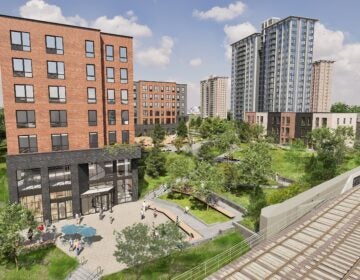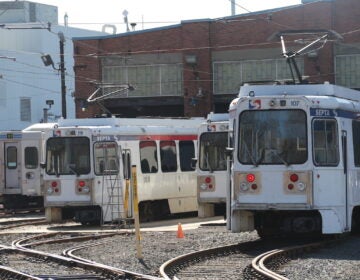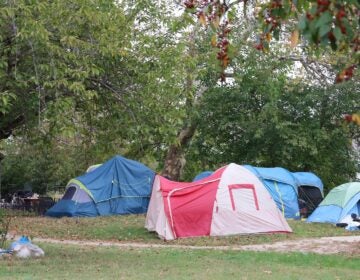You want to fix Philadelphia’s infrastructure?

June 20
Mark Alan Hughes
By Thomas J. Walsh
For PlanPhilly
For the second time in three nights, the auditorium at the Academy of Natural Sciences on the Ben Franklin Parkway was packed, with an overflow crowd watching on large screens in the lobby.
The occasion this time was “Greening Philadelphia’s Infrastructure” and the introduction of Mark Alan Hughes, Philadelphia’s first director of sustainability, a new cabinet-level position in the Nutter administration. Hosted by the Academy’s Town Square Program, Hughes was the featured speaker, preceded by a panel discussion that included his New York City counterpart.
And like Nutter, he lived up to his build-up, delivering a crisp and riveting 30-minute outline of what he has in mind for his new role. Wielding the demeanor of the college professor he is, he kept the classroom rapt with well-defined goals, realism and plenty of off-the-cuff humor. All with no PowerPoint.
A Distinguished Senior Fellow at Penn’s Fox Leadership Program, a social scientist and an accomplished city planner, Hughes is no wide-eyed optimist. A former columnist for the Philadelphia Daily News, he was a frequent and harsh critic of the Street administration, and declared many of Philadelphia’s problems “unfixable” – inner-city poverty, chronic violence, blight.
For years he decried Street’s Neighborhood Transformation Initiative, pronouncing the anti-blight program “over” three years ago, with the designated money gone, via “a ‘Trojan horse’ for dumb growth.” (NTI, administered by the Redevelopment Authority, was frozen by Nutter earlier this month after major accounting and management problems were revealed. He appointed a top economic adviser and the city’s finance director to take over RDA oversight.)
In one of his last columns in October 2007, observing the huge expectations of the impending Nutter administration, Hughes declared, “I may be the last publicly pessimistic person in Philadelphia.”
But Thursday night, Hughes was extremely upbeat, calling Nutter the “game-changer” that the idea of environmental sustainability in the region needs – not for pie-in-sky green dreams, but for having the will to actually change the rules of the game within six months of taking office. He cited “capacity-building” within city government through the creation of the Office of Sustainability itself, along with its absorption of the city’s municipal energy office. He listed the adoption of PhillyStat and the planned 311 service system, the resuscitation and dental implants given to the City Planning Commission, the overhaul of the city zoning code and the combining of the city’s recreation department with the Fairmount Park Commission, among others.
All of that was germane to the “green economy” by way of his asking, “What is this thing really, and what are the implications? Ten years ago it was the ‘New Economy.’ No one is talking about the New Economy any more, and there’s a cautionary tale there.”
“This,” he said, “is the economy.”
These kinds of observations made it easy to envision Hughes, a bespectacled, bearded Ph.D. in a glen plaid jacket, blue jeans and shoes with no socks, in front of a blackboard on a leafy Ivy League campus. But there was something of the Motley Fool in the message, too.
It’s bad enough that most people don’t think about their own futures, he said, let alone those of their grandchildren. Forget about global warming for a moment, he said. It’s shocking how many people refuse their employer’s money by choosing not to enroll in 401(k) programs, for example. “We routinely overlook our own futures. What we need is leadership that can mobilize the present.”
And that’s why he says Nutter is a legitimate game-changer. “The stewardship implied and demanded by, say, prisoner re-entry [programs] and [an emphasis on] public education is a very close cousin to environmental sustainability,” Hughes said. “Mayor Nutter has shown a dedication to the future.” The opportunity, he said, is here-and-now. It was an echo of Nutter’s remark from Tuesday that, “quite honestly, we don’t have a moment to lose.”
On top of that, Hughes is literally banking on Nutter staying in office through 2016. He stressed the importance of regional and nongovernmental funding and resource-sharing from philanthropies, foundations, nonprofits and citizens to get his targeted budget passed by the end of 2008. That is an extremely bold goal in Philadelphia, where some city departments routinely don’t even pay their own electricity bills, relying instead on the city’s general fund for a de rigueur, after-the-fact bail-out.
The payoff for meeting the immediate needs of the Sustainability Department, though, would be enormous, he said. It would mean the ability to craft a comprehensive seven-year plan for significant change under the care and feeding of the administration.
New York: Steal this book
On hand for the panel, and for a day-long workshop on environmental issues at Drexel University earlier Tuesday, was Melissa Wright, an energy policy adviser for the Mayor’s Office of Long Term Planning and Sustainability in New York City, launched by the Bloomberg administration in April 2007. Since then, the department’s program, known as PlaNYC, has generated 127 initiatives, with a majority of them already underway.
By 2030, New York’s population is expected to jump from 8.2 million to almost 9.25 million, Wright said, a powerful incentive to address aging infrastructure, if nothing else. PlaNYC focuses on several main areas and drills down from there: air, land, water, transportation, energy and overall climate change (see below for a link). Its concerns range from a comprehensive greenhouse gas inventory to measuring miles of new bicycle lanes and numbers of potholes fixed.
How to manage what might appear to be a bureaucratic nightmare of Kafkaesque proportions? By “citywide performance reporting,” Wright explained – publicly accessible information on progress, via the Internet, with a manual on the program available in hard copy. “We are taking it out of the agency level and creating a page specifically for the Office of Sustainability,” she said. “This way we’ll keep ourselves accountable in the future, and beyond the Bloomberg administration.”
Ambitious and large in scope, detailed in its reporting protocol and inventive in its metrics, Hughes has an exceptional template to follow in PlaNYC. Wright seemed more than eager to share the wealth, and her reception Thursday night proved that many Philadelphians would be more than happy to accept it.
Not very long afterward, when Hughes took the podium, he shamelessly said he would do just that. “I’m thinking of calling it ‘Phlan,’” he quipped.
It won’t be easy. The panel discussion that preceded Hughes’ talk, essentially a recap of the group’s daytime sessions, proved it is far from it. Just agreeing on the various academic justifications for concentrating on sustainability was complicated, as explained by Richardson Dilworth III, a Drexel political science professor and the panel’s moderator.
Slaying the Dragon
Hughes said that New York “has comprehended in the endlessly impressive PlaNYC” that an additional million people will likely be arriving there in the coming decades.
“That is quite a dragon to slay,” he said. “What’s our dragon? We have the most difficult dragon – we have the upside opportunity.”
Philadelphia has been losing people for decades, rather than gaining them, he reminded the audience, even as Center City’s population has exploded. We’ve got great new condominiums, but they are cheek-by-jowl with infrastructure problems galore, a decrepit housing stock in many neighborhoods, and thousands of acres of brownfields and abandoned factories. Given the size of the city and the number of people it has been built up for, “it often seems to be missing a million people, and in a way it really is.”
Not everyone can live in a Center City loft, but there’s a lot of space left in other neighborhoods, he seemed to be saying. And since a population shift to urban areas is global, Philadelphia is once again competing with cities like Baltimore for new residents and new entrepreneurs. The real upside opportunity in this region, he wrote as far back as 2003 in one of his columns, “is how to conserve and exploit existing places.”
In the five years hence, the economy has stagflated with rising unemployment, soaring fuel costs affecting every type of business, empty-nesters and an aging population, and a devastating housing situation. The upside opportunity, it would appear, has become even steeper.
Though “green collar jobs” is not one of his favorite phrases, Hughes said that a green economy has a place for both the high school graduate and the Ph.D.
“We create problems for ourselves [when] we create too small a boundary for ourselves,” he said. “We miss the industrial economy where white-, blue-, and pink-collar workers were interdependent on each other.” Restoring a local distribution of jobs and resources, creating an interdependency in a city now empty of industry but full of opportunity, is at the heart of sustainability.
The Natural
If the Nutter administration wants its sustainability department taken seriously – quickly organized with volunteers, fully backed by City Council and well funded with external resources – it would do well to get Hughes’ mug on local TV news, early and often. The mayor got his share of laughs and applause lines Tuesday night, but on Thursday evening, this guy flat-out owned the room.
For all the serious subject matter, the longtime environmentalists in the room no doubt felt that a moment had finally arrived when the mainstream public got the message about their main streams. While Hughes presented serious challenges, he did so while cracking wise throughout, not missing a beat as he tossed off bon mots left and right. He inspired with anticipation and backed the crowd down with cold realities. He’s Tom Hanks to Nutter’s Denzel Washington. And since we’re evidently at the point of hyperbole here, consider this: If there was anyone who could combine general scientific and macroeconomic concepts together in one sentence that makes sense and come out of it by nailing a laugh line, you wouldn’t think he’d be an academic, or a politician.
Hughes managed that feat, a couple of times. And he’s both.
Contact the reporter at thomaswalsh1@gmail.com
ON THE WEB:
PlaNYC, New York’s comprehensive sustainability plan: www.Nyc.gov/2030
Mark Alan Hughes: http://www.mahughes.org
Nutter’s June 17 speech: http://www.planphilly.com/node/3334
WHYY is your source for fact-based, in-depth journalism and information. As a nonprofit organization, we rely on financial support from readers like you. Please give today.






